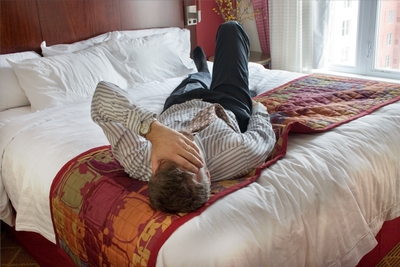If you travel regularly, you know how hard it can be to get a good night’s sleep in an unfamiliar place. Unfortunately, a night of hotel sleeping is usually followed by the kind of big day you’d like to be well-rested enough to enjoy. The last thing you want to do is wake up tired, groggy or cranky.
If you worry about your ability to get a good night’s rest in a strange bed, try these simple tips for sleeping in hotels.
1. Choose your hotel by its bedding.
Not all hotels take the same approach to mattresses. Some provide high-end, highly durable sleeping situations, while others just get whatever is inexpensive. When you check out a potential hotel, don’t just judge it by price. Investigate the room amenities to find out what kind of mattress the facility provides, and remember: you can always ask for additional pillows.
2. Bring your own alarm clock.
If you’re concerned that the hotel alarm clock or wakeup call won’t work properly, avoid nighttime anxieties by bringing your own. You can also schedule more than one wakeup call to ensure that the front desk won’t forget. This is especially helpful if you tend to sleep through alarms.
3. Pay attention to room location.
You don’t have to take the first room that the hotel offers. If you often have trouble sleeping, avoid rooms that are close to the stairwell, elevator or other high traffic areas. You can also change rooms. If your first one seems to have a thin ceiling, try transferring to one on the upper floor. You can also use white noise generators, fans, or foam earplugs.
4. Stick to a routine.
If you have a sleep routine you usually follow at home, being on a trip is no reason to deviate. By maintaining a similar schedule and set of behaviors, you’ll be able to convince your body that it’s time to rest, even if you’re not in familiar surroundings.
5. Avoid bright lights.
Sound isn’t the only sensory factor that can keep you up. Many hotels also have excessive light that can disturb your sleep, especially if you’re used to a darker room. Bring clothespins or other clips to prevent gaps between the curtains that allow bright exterior lights or morning sunlight to creep into your room. Cover the alarm clock or any other all-night lights that might distract you. If this isn’t possible, consider wearing an eye mask.
Sleeping in hotels doesn’t have to seem impossible. The next time you travel, simply pay attention to your sleep situation ahead of time. It’ll make a big difference in how you feel the next day.

